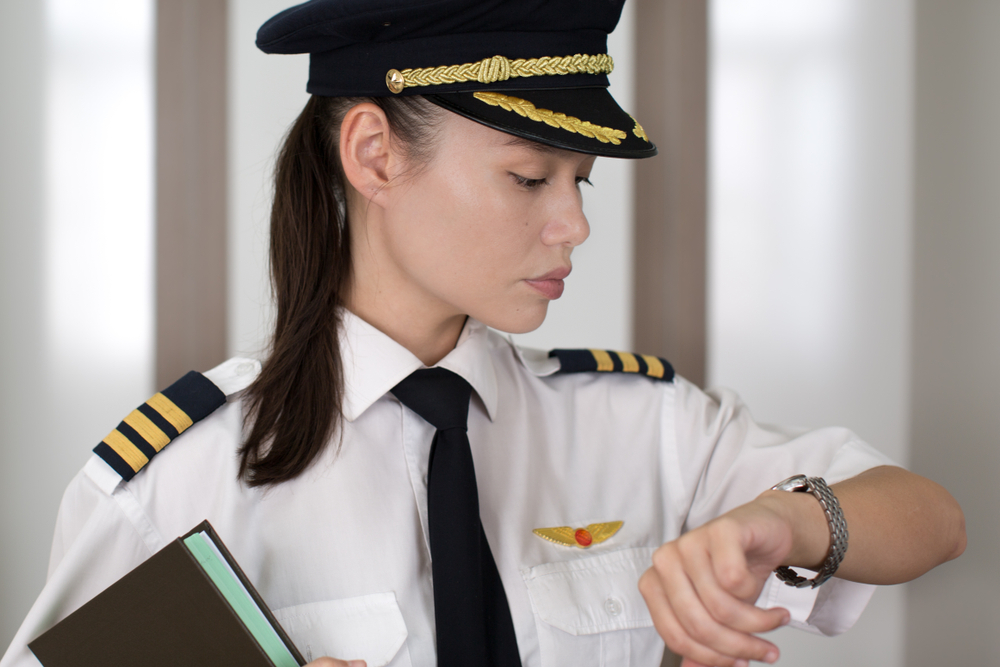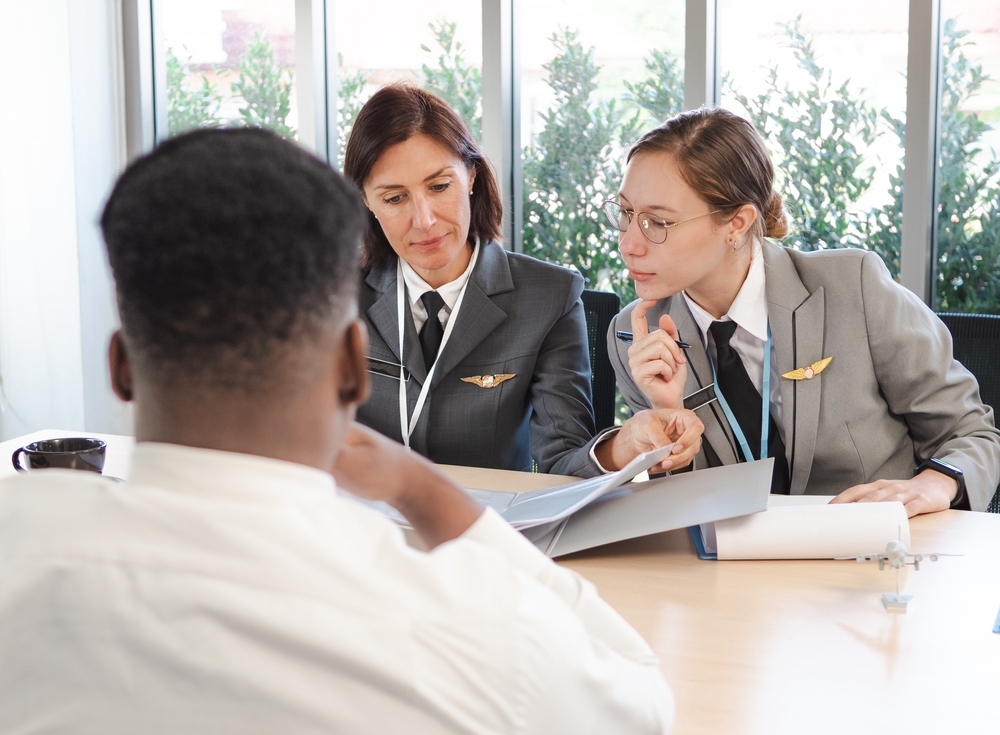Pursuing a career as an airline pilot is a dream for many. However, reaching that goal takes more than technical skills and flight hours. One of the most important steps in this journey is successfully navigating the airline pilot interview process. But do you know how to prepare for this?
In this article, you will find practical tips, common interview questions, and preparation strategies to help you stand out and succeed in your airline pilot interview.
Table of Contents
What is the interview process for airline pilots?
The airline pilot interview process is about more than just testing your technical abilities. It evaluates your personality, personal traits, and how well you fit into the airline’s culture. Do you know what to expect during this process? Understanding each stage can significantly boost your chances of success.
The airline interviews typically consist of three main stages:
- Initial screening: The pilot candidate selection method starts with the initial screening, where your pilot resume and qualifications take center stage. But it is more than just a paper review. This step often includes an online application followed by a preliminary interview. Whether over the phone or via video call, this is your first chance to make a strong impression.
- Technical assessments: Get ready to put your aviation knowledge and problem-solving skills to the test. This stage is all about proving your expertise. You might face written exams, simulator tests, or even a combination of both. These assessments are critical. They evaluate your mastery of essential areas like navigation, flight rules, and aircraft systems.
- Final interview: Now comes the ultimate challenge in the pilot candidate selection method. It is the final interview. This is your opportunity to meet face-to-face with airline management, including HR representatives and senior pilots. You can expect a mix of technical and behavioral questions designed to see how you handle real-world situations. But it is not just about skills. Airlines are also looking for someone who fits seamlessly into their culture.
What are common pilot interview questions?
Knowing what types of questions to expect can give you a big confidence boost and improve your performance. Imagine walking into the interview room with a clear idea of what is coming. It is a game-changer! While each airline has its own style, some questions pop up across the board. What are these common questions? And how can you prepare for them? Discovering the answers might just give you the edge you need!
Top 3 typical airline pilot interview questions:
“Why do you want to work for our airline?”
Tip: It is one of the most common airline interview questions. Dive into the airline’s history, mission, and values. Research recent achievements, fleet expansion plans or unique aspects of the airline that resonate with you. Tailor your response to reflect how these elements align with your career goals and values. Show your genuine enthusiasm for contributing to their success and explain how you can add value to their team.
“Describe a time when you had to handle an emergency.”
Tip: Use the STAR method to structure your response. Start by describing the Situation you encountered. Then, explain the Task you need to complete. Next, detail the Action you took to address the situation. Finally, share the Result of your actions. Focus on showcasing your calmness under pressure. Highlight your ability to make quick, effective decisions. This approach will demonstrate your competency in handling real-life challenges onboard.
“What are your strengths and weaknesses as a pilot?”
Tip: This is another most frequent pilot interview question. Be honest but strategic in your response. Highlight strengths that directly relate to the daily pilot routine and the role, such as your technical skills, teamwork, or leadership. When discussing weaknesses, frame them as areas for improvement and explain what steps you are taking to address them. This shows self-awareness and a commitment to personal growth.

Examples of Technical Interview questions for pilots
Airline interviews typically include a mix of technical and behavioral questions for pilots. Understanding the difference between these and how to answer them can give you an edge. Technical interview questions for pilots assess their aviation knowledge and skills. Examples may include:
- “Explain the function of the hydraulic system in a Boeing 737.”
- “How would you handle a sudden loss of cabin pressure at 35,000 feet?”
Preparation tips. When preparing for an aviation interview, start by revisiting your aircraft systems, procedures, and regulations. Take the time to refresh your knowledge and ensure you are up-to-date. Practice explaining complex concepts simply and clearly. How can you make these details easy to understand? Think of ways to break down information so it is engaging and straightforward!
Make this preparation phase exciting. Turn it into an opportunity to showcase your expertise and enthusiasm. Imagine this as your stage to shine and impress. How will you stand out and highlight your skills? Show what you are capable of!
Examples of Behavioral Interview questions for pilots
Behavioral interview questions for pilots dig into your past experiences to help predict how you will handle situations in the future. They are all about understanding your behavior and decision-making.
For instance, you might be asked about:
- “Tell us about a time when you had to work with a difficult crew member.”
- “How do you prioritize tasks when under pressure?”
Preparation tips. Getting ready for an airline pilot interview takes time and focus. Start by reflecting on your experiences in the cockpit and beyond. Consider the moments when you tackled challenges, collaborated with diverse teams, or made quick decisions under pressure.
Prepare specific examples that highlight your ability to handle stress. Practice discussing these examples with confidence and clarity. Even when you talk about difficult situations, emphasize the positive outcomes and what you learned. This approach will help you stand out and show that you are ready for any challenge.
How to practice for a pilot interview?
One of the most fun and effective ways to prepare for an airline pilot interview is by doing mock interviews. Think of it as a practice flight for your real interview. Simulations in a pilot interview preparation process help you sharpen your answers, build confidence, and calm your nerves. Before you begin, remind yourself why you chose a career as a pilot and why you are the ideal fit for the pilot role. Give it a try and see how much smoother your actual interview can be!
Benefits of doing mock interviews:
Realistic practice: Mock interviews replicate the environment of a real aviation interview. Set up a mock interview in a space that mimics the conditions of the actual interview. For example, if the real interview will be virtual, practice via video call. If it is in person, create a similar setting to get used to the physical space and formal tone.
Practice answering common questions out loud, just like you will need to in the actual pilot interview. Focus on clarity and confidence, and do not shy away from tough questions. Use tools like flight simulators or aviation apps during your mock interviews to get used to realistically discussing technical aspects.
Constructive feedback: Do your mock interviews with friends or mentors to get feedback and refine your responses. After each mock interview, review your performance with your mentor, where you may discuss what went well and what could be improved. For example, if you struggled with explaining your approach to managing flight delays, use this feedback to refine your answer.
Practice talking about aircraft systems, procedures, and regulations, and be ready to explain complex concepts simply. Also, rehearse discussing past experiences that highlight your problem-solving and teamwork skills.
Improved confidence: The more you practice during the pilot interview preparation stage, the more confident you will feel. Engage in multiple mock interviews to build your self-assurance. To mimic the pressure of the actual interview, practice answering questions under timed conditions or in a high-stress environment. This will help you stay composed and think clearly when the real interview comes.
Each practice round makes you a little more polished and prepared!
What to expect on the pilot interview day?
Your pilot interview day is a key moment to shine. Knowing what to expect can turn any nerves into excitement. From choosing the right outfit to arriving on time and presenting yourself confidently, every detail matters. Let’s break down how you can make this day go smoothly for you.
Pilot interview day essentials:
- Attire: Think of this as your chance to make a stellar first impression. Whether it is a sharp suit or a smart business dress, your appearance should convey respect and seriousness about the role.
- Punctuality: Aim to arrive at least 15 minutes early. This is not just about being on time. It is about preparing yourself as if you were setting up for a flight. Arriving early gives you a moment to relax, review your notes, and mentally gear up for the interview. Picture it as your pre-flight checklist — an opportunity to get everything in order before takeoff. Arriving at the pilot interview early also shows your commitment and respect for the interviewers’ time.
- Interview etiquette: Bring your A-game with a polite demeanor and enthusiastic attitude. Listen carefully to each question and answer with confidence. Keep your posture upright and make eye contact to show that you are engaged and ready. How will you convey your passion for flying? Maybe through a lively discussion about your favorite aviation experiences or a genuine smile that reflects your excitement. Your positive energy will not only help you connect with the interviewers but also leave a memorable impression. Approach the day with the same energy you would bring to the cockpit.
- Essential items to bring to the airline pilot interview: Be sure to pack these key items for your pilot interview: several copies of a pilot CV, your flying license, your logbook, and your Class 1 medical certificate. Do not forget a notepad and pen for taking notes, along with any required forms or documents. Also, bring your ID and any relevant letters of recommendation. Having these essentials ready will help you stay organized and make a fantastic impression.

Post-Interview tips for pilots
Your efforts do not end once the pilot interview is over. The steps you take afterward can leave a lasting impression. What can you do to stand out even more post-interview?
- Start by sending a thank-you note. Craft a brief, courteous email to each interviewer. Express your appreciation for the opportunity and reiterate your enthusiasm for the role. This simple gesture shows that you value their time and reinforces your interest. It is like sending a small signal that says, “I’m still excited and ready to fly!”
- Take some time to reflect on how the interview went. What were the highlights? Did you handle tricky questions smoothly, or is there something you wish you would answer differently? This self-reflection is crucial for your growth. It helps you pinpoint strengths and areas for improvement, preparing you for future interviews. Will you tweak your responses based on what you learned, or practice specific scenarios more intensively?
- Update your resume and portfolio: If any new skills or experiences come up during the interview, make sure to update your resume and portfolio to reflect these.
- Follow up on any action items: If you were asked to provide additional information or documents, make sure to send them promptly. If you were invited for a second interview or additional assessments, start preparing immediately. Review your notes and continue practicing key areas.
- Stay in touch: Connect with your interviewers on professional networks like LinkedIn, if appropriate. It keeps you on their radar and shows continued interest. Reach out to mentors or colleagues in the industry for their perspectives on your interview performance and advice on how to improve.
The post-interview period can be a waiting game. Stay positive, and patient, and keep applying to other opportunities if necessary. Use this time wisely to review and prepare, and you will be well-equipped for future flights!
Remember, a strong performance is not just about what you know; it is also about how you convey your passion, expertise, and readiness for the pilot role. Stay organized, be confident, and use every opportunity to highlight why you are the perfect fit. With these tips, you are not just preparing for an airline pilot interview — you are setting yourself up for a fantastic pilot career.

